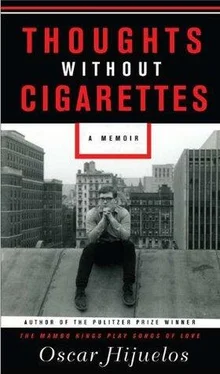That day, I got my first sense of why the man, as I’d learn, happened to be one of the most successful art dealers in the world: He was good at making you feel that his intentions were really your own. And he knew just which buttons to push. On our way out, while leaving it that I would meet him at some future point in his favorite restaurant, the Four Seasons, to talk over things further, he telephoned his chauffeur, a former cop named Bob, and gave him instructions to take us wherever we wanted to go in his limousine. I was startled. The only time I had ridden in a limousine before was for my pop’s burial out in Long Island. After dropping Ms. Wasserman off at her place on East Eighty-sixth, I found myself being shuttled uptown toward my old neighborhood like a pasha. I liked his driver — a real working-class man, of Sicilian roots, the sort with whom I always got along, a real salt-of-the-earth fellow. We talked, mainly about the Howard Beach area of Queens — my brother’s second wife had a lot of family out there, and that Italian connection opened Bob up as if he were an old-time chum and confidant. Eventually, he told me how much he thought Mr. Glimcher was worth — a stupendous amount. “And that’s not includin’ the value of his artwork, capiche ?” I used to think that he was just confiding in me as one working-class guy to the other, but I can’t help wondering now if I was set up, those incredible numbers meant to further impress me.
I do know that riding in a limousine made me feel both well-off for the first time in my life and also somewhat embarrassed. Asked “Where to?” I had him stop at a picture frame shop on West Eighty-sixth, and then I went right next door into a comic shop to look around. My next destination in that fabulous limousine? Some exotic bar on the East Side or downtown in Soho? No: the Food Town supermarket on One hundredth Street and Broadway, where I bought some groceries. Afterward, when I came out with my bags (chicken, potatoes, carrots, tomatoes), I thanked Bob for his help and told him I didn’t mind walking for a bit. (It didn’t seem a healthy thing for me to be seen pulling up to my building on 106th Street in such a richlooking vehicle.) He just nodded, tipped his cap, and drove off, while I made my way those six or so blocks, my head spinning with a deepening wariness about the possible direction in which my life might be headed.

You see, I was no budding Jay McInerney, a novelist famed for zestfully embracing the bounties of his success. I simply didn’t trust that world. And while I appreciated the attention I seemed to be getting from the likes of someone like Mr. Glimcher (who at a different point took me into the inner sanctum of his gallery and had his assistant bring in one Picasso oil after the other for me to view and even touch if I wanted to — Unbelievable, if only my pop could see me, is what I actually thought), I felt tremendously grateful for the opportunity to get out of New York when the occasion arrived.
My teaching stint in Lake George came along at just the right time, during that nerve-racking prepublication stage when my manuscript was being turned into page proofs for a bound galley. My appointment as a resident writer, which was to last some six months, began in the autumn of 1988—think it was late October when I first arrived. There, in a meeting room in a former courthouse just off the lake, along Canada Street, I taught a weekly workshop in creative writing, free to the public. My students were a wonderful group of locals, consisting of both the well-heeled and well-educated country club folk — doctors, lawyers, and dentists among them — and struggling working-class mothers, along with a handful of normal middle-class people, with some quite interesting backwoods folks and retirees thrown in.
I lived in a mountainside house overlooking the Hudson River, about twenty miles north of town, with a couple who had kindly offered to put me up for practically nothing. The husband, an ex — Benedictine monk, taught art at a local college and made totemic sculptures that he sold throughout the Adirondack region, while his wife, who had tracked me down on behalf of the arts center in the first place, ran most of its public outreach programs. I won’t go much into my life there except to say that, as sojourns go, it was about as far removed from New York, or for that matter, Italy, as any place could be. I learned to drive a stick shift there, however, good for maneuvering a car over the mountains, and I made a lot of friends as well. It turned out that the art center’s director happened to be a singer with one of the best-known country rock groups in the region, the Stony Creek Band, with whom, in that latest incarnation, I began to perform as a sit-in guitar player, at local country clubs, barn-style dances, and in the kinds of Adirondack joints that would have found their New York City equivalents in the leave-your-guns-by-the-door discos in the South Bronx of 1982. That was yet another life, and brief as it had been, I loved being away from the buildup for the book, and that distance made dealing with such chores as correcting the manuscript a bit easier.
I also signed that option with Glimcher’s Pace Productions, having entrusted all the contractual business to my agent, who, as I would eventually learn, was also in over her head, having little practical knowledge of the movie business. But I much enjoyed the Lake George area while my stay lasted, and then, of course, as I’d received news that a bound galley of my book had been finally produced, and that there were things I’d have to do, I returned to New York.
Once home, I did my best to maintain a kind of cool among my old friends from the neighborhood. They tended to have a blasé attitude about my profession, as if anyone could do it, and when it came to the folks I’d meet while visiting my brother’s in-laws out in Howard Beach, where they’d hold backyard barbecues a few blocks from where John Gotti lived, I’d feel so out of touch with the writing world that, whenever someone asked me what I did, I hardly thought it worth mentioning, though I inevitably would. (“Oh, yeah, your brother told me you write stuff — like what, spy novels?”) Most people were nice, but among some of the strangers I’d meet, the writing profession seemed a bit on the scammy side, and more than once I’d hear something like, “So, okay — what do you do for real work?”
During that time, it seemed that I always had some duty to attend to in regards to the prepub biz of the book. Learning that Publishers Weekly felt strongly enough to request an interview with me, I found myself putting on another hat — as a self-believing writer who’d always had a vision for that novel, while, in reality, I’d hardly even figured out any way to talk about it. For that matter, as a publishing world “guinea pig” from the Latino community, I’d have to brace myself for any number of questions about the ethnicity of my writing and about the status of Latino writing in this country — but, so warned my agent and anyone else at the house I happened to talk to, I would have to be careful not to offend anyone by stating the obvious fact that, on the surface of things, no one, to that point, had seemed to give a shit for the intellectual and creative life of my/that community. Never claiming to be a spokesperson for anyone except myself and, so I thought, believing that my first novel Our House in the Last World had already presented my take on the issues pertaining to my Latino identity, I learned soon enough that, on just about every occasion, I had to explain myself all over again, even if jokingly so—“I know I don’t look or act particularly Cuban, but it’s just a disguise to find out what folks really think.” That alone was enough to make me dread the very notion of speaking to any journalists at all.
Читать дальше













